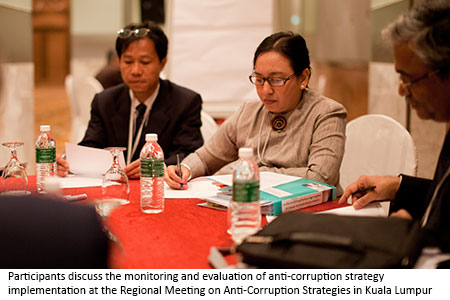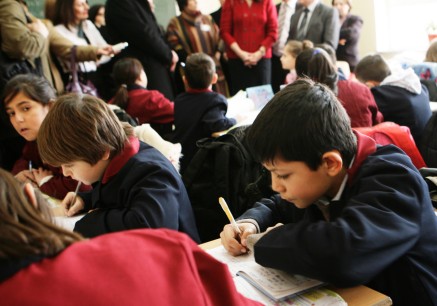
Photo: UNODC (
On 21-22 October 2013, high level representatives of anti-corruption authorities as well as national planning authorities from the South, East and Southeast Asia and anticorruption experts from around the world gathered in Kuala Lumpur at the invitation of the United Nations Office on Drugs and Crime (UNODC) and the United Nations Development Programme (UNDP), in partnership with the Government of Malaysia, to discuss a set of Guidelines for Anti-Corruption Strategies, that could instruct the process of developing, designing and implementing sustainable anti-corruption strategies.
The participants included several officials of anti-corruption authorities, other anticorruption practitioners, and representatives from national planning authorities, and executive, legislative and judiciary branches. Representatives of UNDP, UNODC, the World Bank, the ADB/OECD Anti-Corruption Initiative for Asia and the Pacific, Transparency International and U4 Anti-Corruption Resource Centre also took part in
the proceedings.
The participants reviewed and discussed country experiences from around the world, with a particular focus on South, East and Southeast Asia, relating to the process of developing anti-corruption strategies, the design and content of anti-corruption strategies and the monitoring and evaluation of anti-corruption strategies.
The Asia Regional Meeting on Anti-corruption Strategies aimed to have participating countries share their experiences in developing, implementing, and monitoring the implementation of anti-corruption strategies. It sought to clarify the preparation process of anti-corruption strategies; analyze the content and design of effective anti-corruption strategies; and identify mechanisms to ensure effective implementation, monitoring, oversight and reporting.
“While the development and launch of national anti-corruption strategies shows that many governments are committed to fight corruption, these strategies have not always yielded the expected impact,” said Mr. Phil Matsheza, Practice Leader, Democratic Governance, UNDP Asia-Pacific Regional Centre in Bangkok. “This conference hopes to provide States with the knowledge and tools to carry out effective anti-corruption strategies.”
A key Meeting outcome was to get participants to agree on a set of guidelines or indicators to develop and implement an effective and successful national anti-corruption strategy.
In the opening speech Hon. Senator Datuk Paul Low Seng Kuan, Minister in the Prime Minister’s Department pointed out: “No nation can sustain economic progress unless corruption is eradicated or significantly reduced. Many challenges and problems caused by failed economic management and crime are related to abuse of power and corruption.”
The work of UNODC and UNDP includes assisting countries in the region to address anti-corruption issues collaboratively, including working with States to develop or revise anti-corruption strategies. Meeting participants focused on South, East and Southeast Asia country experiences as they reviewed the development, design, and monitoring and evaluation of anti-corruption strategies from around the globe.
“South-South Cooperation is essential to improving existing anti-corruption strategies and designing new ones,” said Michelle Gyles-McDonnough, UN Resident Coordinator for Malaysia. “By sharing our experiences, challenges, best practices and guidance we remove obstacles to creating a more secure and better future for our fellow citizens, to creating countries that grow, countries that care, and countries that work.”
Download here the Kuala Lumpur Statement on Anti-corruption Strategies
Read more





